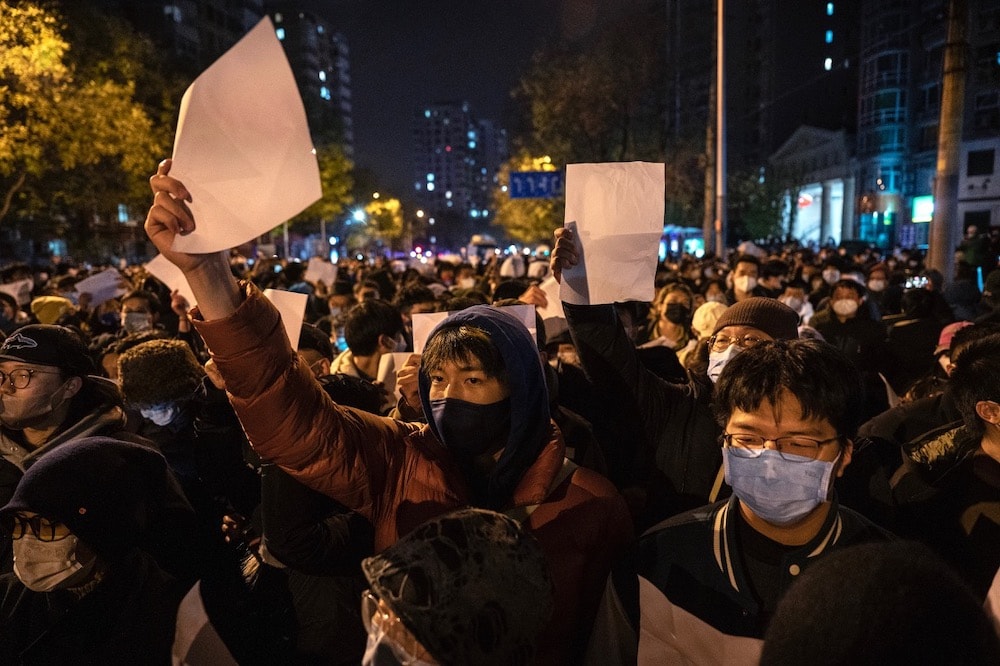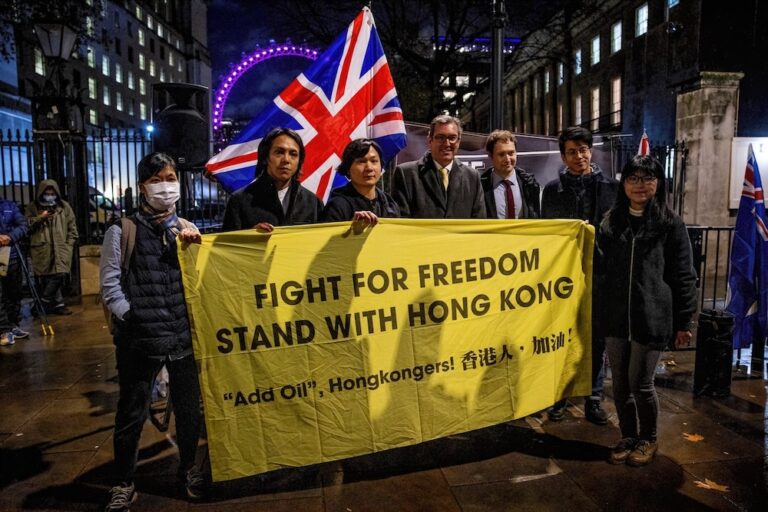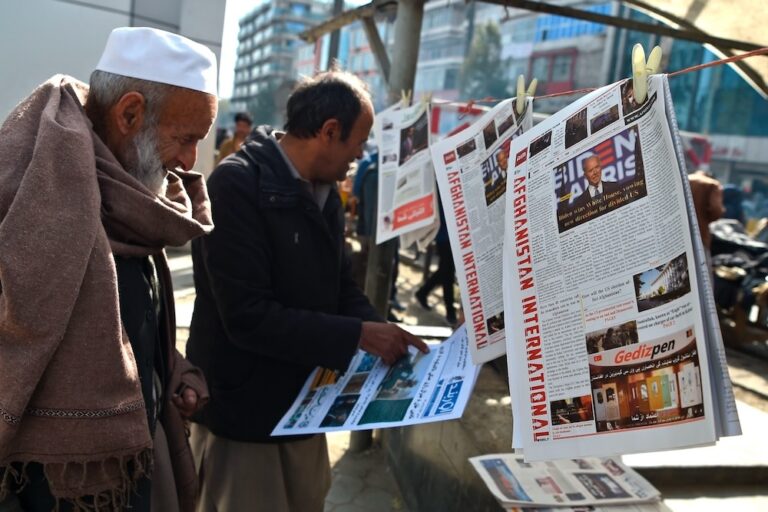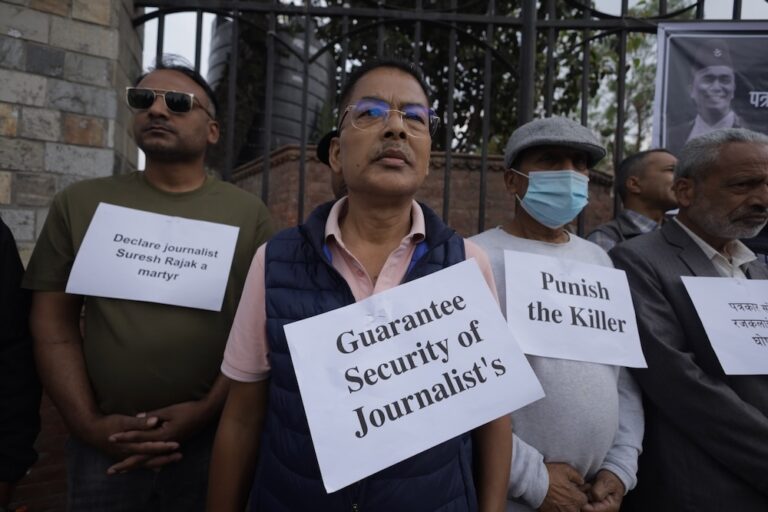November 2022 in Asia-Pacific: A free expression round up produced by IFEX's regional editor Mong Palatino, based on IFEX member reports and news from the region.
Anti-lockdown protesters are demanding freedom and democracy in China. #SayNoToHateSpeech campaign challenged racist and sexist election narratives in Malaysia. Journalists attacked and arrested for asking tough questions during press conferences. Mass release of prisoners in Myanmar.
From Urumqi to Shanghai, a new wave of protests across China
Spontaneous street protests erupted in several cities across China after news broke out that a fire at a residential building in the Xinjiang capital of Urumqi on 24 November 2022 killed at least 10 people. Protesters blamed the government’s zero-COVID policy and strict lockdown measures for causing the tragedy.
Aside from mourning the dead in Urumqi, those who joined the protests also expressed their anger and frustration over the pandemic restrictions imposed by the government. In some cities, protesters carried white sheets of paper to symbolize censorship while demanding the right to freedom of expression.
In an interview with Global Voices, journalist Vivian Wu pointed out the significance of the protests sweeping the country.
“This is unprecedented in a country with no freedom of speech, no right to demonstrate even in small groups. People are desperate and feel they have nothing to lose after nearly three years of drastic policies.”
In Shanghai, police briefly arrested journalists Edward Lawrence of BBC and Michael Peuker of Radio Télévision Suisse who were covering the protests. The Foreign Correspondents’ Club of China (FCCC) has condemned the actions of the police. “The FCCC is very disappointed and frustrated at the increasing barriers placed on foreign journalists operating in China and the aggression displayed towards them by police”.
Despite the massive surveillance and prohibitions on public assemblies, Freedom House’s China Dissent Monitor has recorded 668 instances of dissent from June to September 2022, as people spoke out against stalled housing projects, labor rights violations, fraud, COVID-19 policies, and state violence. In about one fourth of the cases, people faced reprisals from authorities, which could be an indicator of how the ongoing protests will be dealt with in the coming days and weeks.
Pushback against impunity
IFEX published a special brief tackling how various stakeholders in the region are countering attacks against the media and holding the perpetrators of violence accountable. From partnering with human rights institutions to providing legal aid, civil society groups have launched numerous initiatives aimed at protecting the safety of journalists.
IFEX also marked the 13th anniversary of the Ampatuan Massacre in the Philippines by releasing a Twitter thread highlighting the continuing campaign for justice for the murdered journalists despite the 2019 conviction of some members of the Ampatuan clan.
The valuable role of civil society groups in tackling impunity was discussed in Vienna at the High-Level Multi-Stakeholder Conference on the Safety of Journalists. Owais Aslam Ali, secretary general of the Pakistan Press Foundation was part of the panel which presented the perspectives of groups monitoring the progress of the United Nations Plan of Action on the Safety of Journalists and the Issue of Impunity.
“Local civil society organizations are on the frontline of defending and promoting press freedom and safety of journalists often under very difficult circumstances and their contributions must be recognized,” Ali said.
Hate speech and censorship during the election campaigns in Nepal and Malaysia
In Nepal, IFEX member Freedom Forum called out the Election Commission for issuing several orders that undermine freedom of expression. First, the Commission ordered the removal of several social media pages informing voters about the failed promises of parties and political leaders. Then, it directed a news website to remove an alleged defamatory story about a candidate. Both orders were not immediately enforced after they were criticized for violating free speech.
Freedom Forum also issued a statement against the Press Council for demanding an explanation from a national daily in relation to an editorial cartoon lampooning the country’s former prime minister.
Freedom Forum Executive Chief Taranath Dahal assailed the “repeated misuse of Press Council Nepal to castigate journalists” who have been exposing corruption and political irregularities. “The politically motivated letter by the Council further erodes trust in public institutions,” he added.
In Malaysia, IFEX member Centre for Independent Journalism (CIJ) has partnered with several universities to monitor and prevent the weaponization of hate speech in the country’s general election.
Its mid-campaign monitoring report highlighted how race and religion-based narratives, and hate speech promoting negative stereotypes around sexual orientation and gender have been amplified during the campaign period. It discussed how major parties promoted the “Ketuanan Melayu” (Malay Supremacy) narrative, which is accompanied by anti-Chinese rhetoric. It also warned about how migrants and refugees have been negatively portrayed in the run-up to the elections.
To counter these dangerous narratives, it released resource guides for journalists and voters to respond more effectively to hate speech and disinformation. It also asked internet users to report hate speech content through its monitoring website.
Banned, attacked, and arrested for critical coverage
In South Korea, journalists from news outlet Munhwa Broadcasting Corporation (MBC) were refused access to President Yoon Suk-yeol’s flight after they were accused of “distorting” diplomatic coverage. But the Journalists Association of Korea rejected the reason given by the president and described the decision as “anti-constitutional and anti-historical restrictions on reporting.” Some journalists from other media companies refused to board the flight in solidarity with the banned MBC reporters.
Similarly, in Cambodia, reporters from news outlets VOD and VOA were denied access to Prime Minister Hun Sen’s two-hour press conference following the ASEAN Summit on 13 November. No reason was officially given for issuing the ban. Media groups including IFEX member Cambodian Center for Independent Media released a statement asking the Ministry of Information to “explain the apparent discrimination” against VOD and VOA journalists. The International Federation of Journalists urged the government to “ensure equal access to all journalists and media workers when covering events or issues in the public interest.”
Asking questions during press conferences can also be harmful to critical journalists. In Pakistan, PPF has documented several instances when local journalists were harassed and assaulted because they raised questions deemed insulting by political party leaders and officials.
In Myanmar, two reporters from media outlets broadcasting the propaganda of the junta were arrested for asking about the peace talks, inflation, and the status of detained journalists during the information ministry press conference.
“This is undoubtedly the first time since the coup d’état on 1 February 2021 that Myanmar’s junta has targeted journalists who normally transmit its propaganda – which speaks volumes about the total paranoia now prevailing in Naypyidaw,” said Daniel Bastard, the head of RSF’s Asia-Pacific desk.
Positive news… but
In Hong Kong, radio host and political commentator Edmund Wan Yiu-sing, more popularly known as “Giggs”, was released from prison. He was convicted in October for “sedition” and “money laundering”. RSF welcomed the news but insisted that he should not have been arrested in the first place.
Myanmar’s military government released 5,774 prisoners during its National Day on 17 November. Among those who were granted amnesty were Japanese documentary filmmaker Toru Kubota and Mizzima news editor Than Htike Aung. Two other Mizzima journalists are still in prison. Foreigners, including economist Sean Turnell, former British ambassador Vicky Bowman, and Burmese-American national Kyaw Htay Oo, were also set free. But despite the mass amnesty, around 13,000 political prisoners are still languishing in jails, the majority of whom were arrested for defying the military junta which grabbed power in February 2021.
India’s Supreme Court has finally ruled that anyone who conducts the “regressive and invasive” two-finger test on survivors of sexual assault or rape will be guilty of misconduct. The government had already prohibited this patriarchal practice in 2014 but the degrading tests have continued, which discouraged many victims from speaking out.
In Japan’s Kanagawa Prefecture, the government has awarded a transgender woman workplace compensation after recognizing her depression was caused by her supervisor who refused to acknowledge her gender. Human Rights Watch said authorities should follow this up by considering the UN recommendation of amending the country’s outdated Gender Identity Disorder Special Cases Act, in order to make it easier for trans people to legally change their gender.



